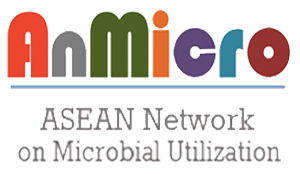ASEAN NETWORK ON MICROBIAL UTILIZATION eng.
ASEAN Network on
Microbial Utilization (AnMicro)

ASEAN NETWORK ON MICROBIAL UTILIZATION
Biological diversity or biodiversity is fundamental for human life, as well as vital for creating environmental balance. Mankind has benefited from biodiversity, as it provides natural services such as fresh water and clean air, biological resources such as medicinal plants and food, as well as socio-economic benefits of tourism. Increasingly, countries are recognizing the importance of biodiversity as an asset that can be developed to add value to their economies. ASEAN member countries are located in South-East Asia with overlapping 4 biodiversity hotspots, “Indo-Burma, Sundaland, Wallacea, and the Philippines”. This rich natural environment enables ASEAN member countries to generate economic value from its biological resources and enhance its competitiveness in emerging biotechnological fields such as green and clean technologies through research and development.
Currently, ASEAN member country is increasingly engaging in research into microbial utilization in various degrees, some looking into the development of biopesticide, while others exploring the potential of microorganisms in pharmaceutical or green industrial applications. To foster the scientific collaboration, ASEAN Network on Microbial Utilization (AnMicro) was established in 2014 under the auspices of ASEAN Sub Committee on Biotechnology. AnMicro is currently joined by 11 academic and research institutes from 6 ASEAN countries, with BIOTEC’s Thailand Bioresource Research Center (TBRC) serving as the Secretariat. The network aims to strengthen the research and human resource capacity through collaboration among members and through the dialogue with other international organizations.
Since effective search for microbial utilization lies heavily on the quality and availability of microbes, management of microbial resources is thus crucial. For this reason, TBRC will promote the practice of microbial resource management among ASEAN member countries through the training and making the iCollect, a software uniquely designed for the management of biological collections, available for members. This will facilitate the formation of ASEAN microbial resource database. This ASEAN microbial resource database can then be linked to the larger endeavors such as the Asian BRC Network (ABRCN) and the Global Catalogue of Microorganisms (GCM).
Visit official website of ASEAN Network on Microbial Utilization (AnMicro) at http://www.anmicro.org/
